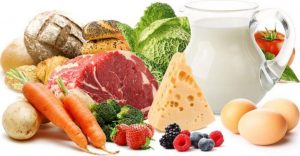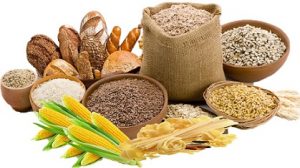Being overweight can cause serious health problems. One of ways to normalize body weight are protein diets. How effective and safe they are, what threatens the transition to full protein nutrition and how to keep protein read the diet in .
Contents
- 1 Food and its composition
- 2 Features of protein diets
- 2.1 Note! Change in ratio, not complete the exclusion of fats and carbohydrates from the menu.
- 2.2 Competent nutritionists say: “Fat burns in the flame carbohydrates. “The more energy the body spends in conditions lack of carbohydrates in food, the sooner self-poisoning develops organism – “ketoacidosis”.
- 3 To whom protein diets are contraindicated
- 4 What to eat and what to exclude during a protein diet
- 5 How to deal with carbohydrates
Food and its composition
The main task of food is to provide the body with the necessary amount of energy and “building materials”.
Various edible products contain in different ratios The following basic nutrients:
- proteins;
- fats
- carbohydrates;
- minerals, vitamins and minerals;
- water;
- ballast substances (e.g. fiber).
For normal functioning, the body needs substances of each from groups. The correct ratio of proteins to fats and carbohydrates in daily diet should look like this:
Proteins: Fats: Carbohydrates = 1: 1: 4

With this ratio, optimal assimilation of all types occurs. nutrients. But even with the right ratio BZHU extra weight will appear if the body gets more calories than necessary.
Features of protein diets
The main difference between protein diets is to change the ratio BZHU in the direction of increasing the proportion of protein food in the daily diet.
To ignorant people it seems that they should completely abandon flour, fat, sweet – and the weight, as if by magic, will begin to decline. However, the metabolism is designed in such a way that for naturally producing energy from fat molecules spends energy extracted from carbohydrates.
Competent nutritionists say: “Fat burns in the flame carbohydrates. “The more energy the body spends in conditions lack of carbohydrates in food, the sooner self-poisoning develops organism – “ketoacidosis”.
Protein molecules can also be deficient in carbohydrates and fats are used by the body for energy. This way is not is natural to the body and leads to increased the formation of urea and creatinine, which increases the load on the kidneys.
It is for this reason that doctors are skeptical and even negative refer to “strict” protein diets, insisting that use such diets can only be healthy adults, and then short-term – within 3-5 days.
So that extra pounds go away quickly and without harm to organism, it is important to combine diet and moderate physical activity, which will force the body to “turn” to accumulated fat deposits.
To whom protein diets are contraindicated
Any disease, especially acute, is stress for organism, increased digestive stress, cardiovascular and urinary systems. Therefore from protein diets should be discarded in the following cases:
- in acute diseases or during an exacerbation of chronic diseases;
- with kidney pathology (glomerulonephritis, urolithiasis, gout);
- with increased blood coagulation, a tendency to thrombosis;
- with obesity of the III-IV degree;
- cancer patients;
- elderly people, children in the period of intensive growth and puberty;
- with diseases of the digestive system (with colitis, gallstone disease);
- pregnant women (during pregnancy, the female body and so experiencing increased stress, especially on the kidneys and a heart);
- patients with diabetes mellitus (such people should strictly adhere to the diet prescribed endocrinologist).
If there is no certainty that there are no contraindications, before a long (more than 5 days) diet is better to undergo a medical examination.

What to eat and what to exclude during a protein diet
Recommended Products:

- low-fat varieties of meat and fish, offal (liver, heart, tongue), seafood;
- bird eggs;
- fat-free lactic acid products, cheese;
- legumes, soy;
- poultry meat (except duck and goose), and without skin;
- fresh and dried high fiber vegetables and fruits (potatoes and bananas – very limited);
- sweeteners, sugar-free candies;
- bran, diet bread with bran;
- olive oil no more than 4 tablespoons per day;
- at least 5 tablespoons of food should be eaten daily, containing complex carbohydrates (optional: buckwheat, brown rice, oatmeal, durum wheat pasta).
Limit salt, avoid spicy seasonings, fomenting appetite. Refuse baking, baking, animal fat, canned food of all kinds, smoked meats and pickles.
It is necessary to drink sufficient or even increased amount of water (unsweetened drinks), at least 30 ml per kilogram of body weight. That is, for a person weighing 60 kg – at least 1.8 liters of water per day.
The daily diet should be divided into 5-6 receptions food, the last meal – at least 2 hours before departure to sleep.
How to deal with carbohydrates
With a protein diet, the menu should contain not only proteins, but also carbohydrates. As you can see from the list above, the allowed products are quite a lot: this is meat, dairy, poultry, and fish seafood, legumes, many types of vegetables and fruits. the main thing the rule is to eat “good” carbohydrates that are not simple sugar, and only in the morning.

It is important to remember that a measure is needed in everything. Protein diets Attractive with quick results. Sometimes weight loss happens so fast that people are starting to think about protein nutrition a panacea. In addition, such a diet is nutritious, you do not have to starve, and the erroneous impression of sufficiency is consumed food. However, doctors caution against passion for protein diets and strongly oppose the complete rejection of carbohydrates. Even with a protein diet, nutrition should be balanced and contain all nutrients, including both fats and carbohydrates.








